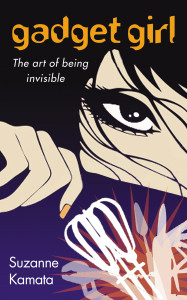JQ Magazine: Book Review – ‘Gadget Girl: The Art of Being Invisible’

“As Gadget Girl is geared toward young adults (or more specifically, teenage girls), it is an easy read. But you get the sense that because of its diverse set of characters, it would make a good TV drama.” (GemmaMedia)
By Rashaad Jorden (Yamagata-ken, 2008-2010) for JQ magazine. Rashaad worked at four elementary schools and three junior high schools on JET, and taught a weekly conversion class in Haguro (his village) to adults. He completed the Tokyo Marathon in 2010, and was also a member of a taiko group in Haguro.
Sometimes, we’re just trying to find out where we belong.
That’s certainly the case with Aiko Cassidy, the teenage protagonist of JET Program alum Suzanne Kamata (Tokushima-ken, 1988-1990)’s latest novel, Gadget Girl: The Art of Being Invisible. The 15-year-old daughter of a renowned sculptor, Aiko wants to develop her own identity, instead of being known as Laina Cassidy’s muse and suffering from a disability (cerebral palsy). Aiko has been secretly working on manga titled Gadget Girl, and she dreams of becoming a world famous manga artist—which would enable her to visit her father in Japan.
But instead of heading to the Land of the Rising Sun, Aiko is off to France for several days, as Laina has won the grand prize at the prestigious Prix de Paris. Although she’s still receiving the “Laina Cassidy’s muse” treatment, the City of Light does open up a new world for Aiko. For one, she develops a crush on a waiter named Hervé at the café she frequents. Aiko is also introduced to the spot where he parents met but more importantly, she learns the reason why her father is absent from her life.
Inspired by the movie The Song of Bernadette, Aiko and Laina head to Lourdes, where Aiko dreams of being cured. Instead, she hears a woman whisper “Forgive,” and Aiko uses that as a call to repair broken relationships in her life.
Gadget Girl starts out slowly—the first half of the novel could be described as “girl experiencing teen angst”—but it really picks up when Aiko and Laina arrive in France (the first several chapters, which take place in Michigan, mostly go into detail about Aiko’s frustration with life in a small town, her crush on a classmate, and her desire to do something great). Even in France, the only real excitement taking place is when Aiko is infuriated by the news that her father’s family shunned her.
As Gadget Girl is geared toward young adults (or more specifically, teenage girls), it is an easy read. But you get the sense that because of its diverse set of characters, it would make a good TV drama because individual episodes could focus on issues certain characters face (e.g., Aiko’s anger with her father’s family, her struggles to publicize Gadget Girl, Laina’s beau Raoul’s clumsiness in taking care of Aiko’s dear indigo plant). With so many characters playing an important role in a relatively short novel, you don’t get a complete feel for their personalities.
Upon finishing the novel, there are several unanswered questions but the most important one is…what will the future hold for Aiko in regards to her relationship with her father?
It certainly looks like more adventures in store for the creator of Gadget Girl.
For more JQ magazine book reviews, click here.


Comments are closed.